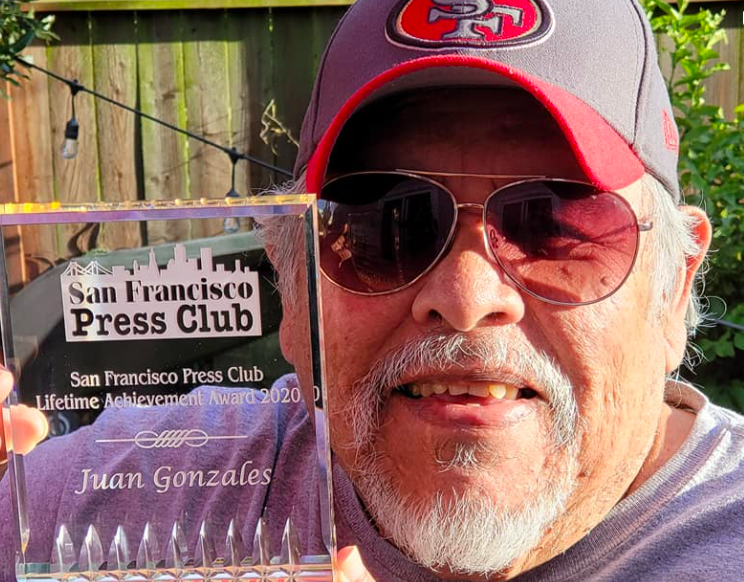San Francisco, 1970s: From student strikes to small organizations uniting into coalitions, “The times dictated that people needed to be involved, and help the community,” El Tecolote Founder Juan Gonzales recently recalled.
It was during that time that the Mission District’s community newspaper was born. This year marks its 50th anniversary — and its history shows the power of neighborhood journalism.

El Tecolote is the longest running Spanish/English newspaper in California and has earned numerous awards from the Society for Professional Journalism and the San Francisco Press Club. El Tecolote’s continued success began with a solid foundation in activism for social change.
Gonzales is the Journalism Department chair at City College. He also serves as faculty adviser to the City College newspaper, The Guardsman, and this year marks 50 years of teaching journalism — 15 years at San Francisco State University and 35 years at City College.
In 1969, Gonzales was a student at San Francisco State University and a reporter for the school newspaper, Phoenix. He was assigned small projects despite his strong experience. Determined to do more, he wrote a five-part series about a convention that led to the formation of the Mission Coalition Organization. His work ran in Phoenix and his research helped him establish connections in the Mission District.
As Gonzales neared graduation, student strikes resulted in the formation of La Raza Studies at SFSU. Faculty asked Gonzales to develop and teach a journalism course within the new La Raza Studies program.
Through these experiences, Gonzales identified a need for a Mission District neighborhood newspaper. Students and former La Nueva Misión reporters met weekly to plan. Eva Martinez, board member of El Tecolote’s umbrella organization Acción Latina, recalls the group developing core principles. First, it had to be bilingual, second, it would not accept revenue from any corporation that harmed the community, and third, opportunity would be open to anyone who wanted to learn journalism.
“Our greatest legacy is that we have been able to hold on to those principles,” Martinez said.
Gonzales recalls hours of discussion as the team tried to find a name that would welcome everyone. When “El Tecolote,” (“the owl” in English), was floated, people said, “Ah, yeah. El Tecolote. I like that. The protector of the community,” Gonzales said. “I think the name helped ease us into the community.”
On Aug. 24, 1970, the first newspaper was distributed. It featured a letter from El Tecolote, beginning with “My name may sound strange and funny to some of you. It may also look peculiar. Even my mere presence, surprisingly enough, may threaten some of you as well. But, I exist because you exist and because others have forgotten us,” (El Tecolote, Volume 1, No. 1, August 24, 1970.)
In the beginning, the paper was nomadic. Gonzales described working in kitchens and garages. Hilda Ayala, one of the first translators, recalls traveling to writers’ houses to pick up article drafts for translation.
From the start, the newspaper broke stories that created change. According to Gonzales, El Tecolote researched telephone operator service and found it took an average of four additional minutes for operators to help Spanish speaking callers. Coverage of this issue resulted in changes to telephone service operations.
El Tecolote also investigated San Francisco General Hospital and showed there were not enough medical translators to meet demand. The coverage resulted in trained medical translators.
In the spirit of service, a complete archive of El Tecolote has been formed. The archive is “an on the ground snapshot of what was going on in the Mission…from 1970 on,” Martinez said. “Newspapers like this serve a very important role of documenting history in a community. That’s something that main-stream newspapers cannot do.”
Neighborhood newspapers do serve communities in unique ways, but despite their important role, they often fold. How has El Tecolote stayed strong for half a century? “It’s basically community power,” current Editor-in-Chief Alexis Terrazas said.
Ayala said it survives because, “There is a lot of love involved here. When my mother came to the United States, she started translating. My daughter and son also worked for Teco. And now I have a granddaughter, who also works for Teco. This is the kind of commitment that people who work for El Tecolote feel. This is our family. We have an obligation to give back to our community.”
Gonzales adds that the newspaper is successful because people dedicated their talent and time. Today, Gonzales continues to be, in his words, the Ambassador of El Tecolote, and in Ayala’s words, the heart of the newspaper. Gonzales is admired for his ability to inspire people to work hard for the best of reasons.
Gonzales is “so appreciative to the army of volunteers who have contributed. There must have been 400 to 500 volunteers over the years. Without that we would not be having this conversation today about achieving a milestone in community journalism. I’m so proud to be a part of that, and so grateful.”
Today, “there still is a deep need for a local, on the ground newspaper that covers issues that are important not only to Latinos, but to progressive people, to people who care about these issues,” Martinez pointed out.
Looking ahead, the founder and the managing editor see an opportunity to expand the newspaper’s reach through increased on-line media.
Whatever the future brings, the words spoken by El Tecolote in the first edition, Volume 1, No. 1, August 24, 1970, have rung true for 50 years — “I am El Tecolote. I am the people. I am yours.”




